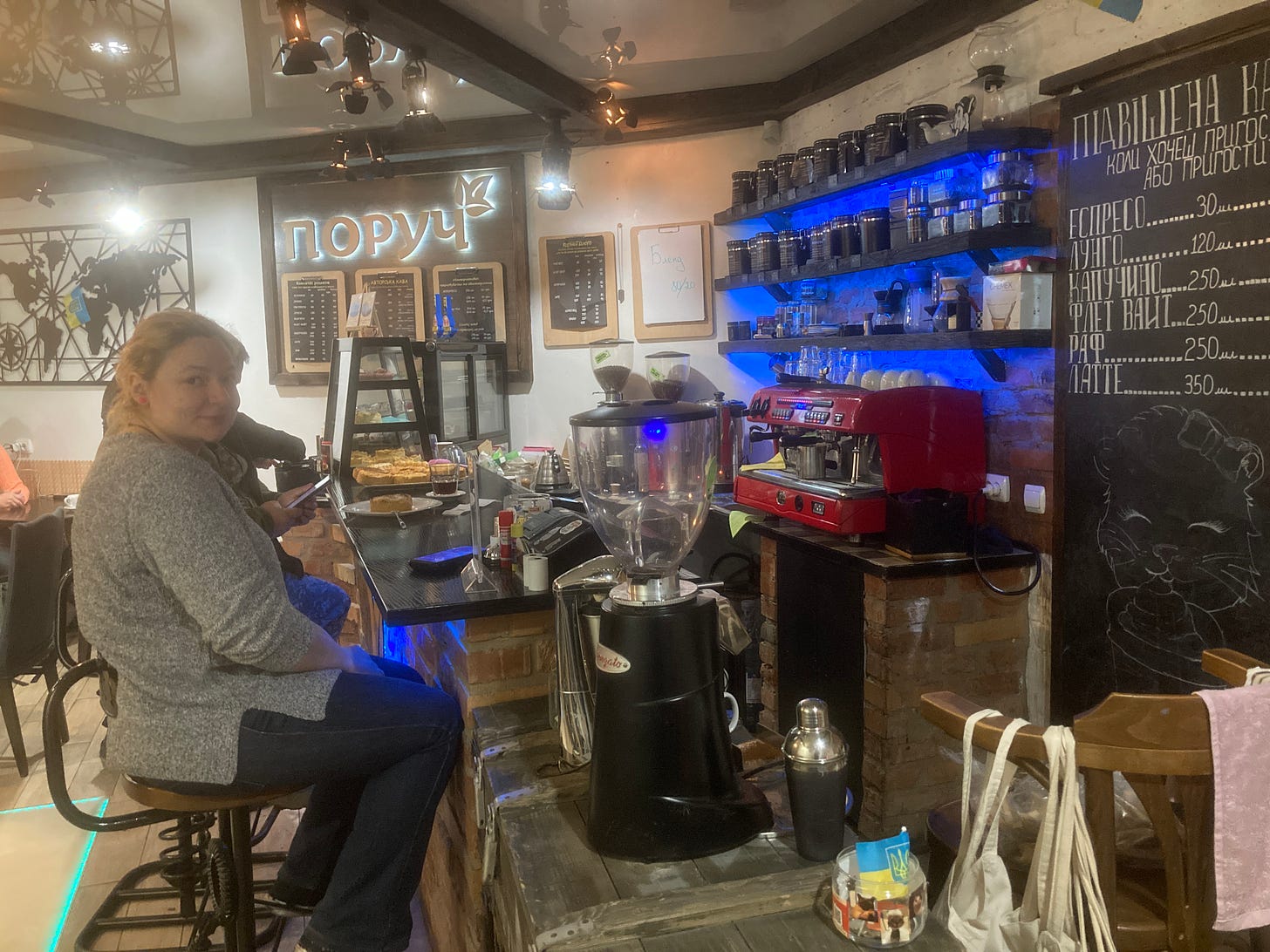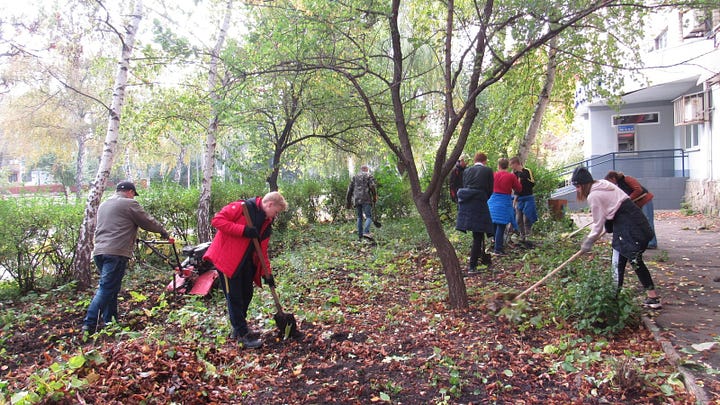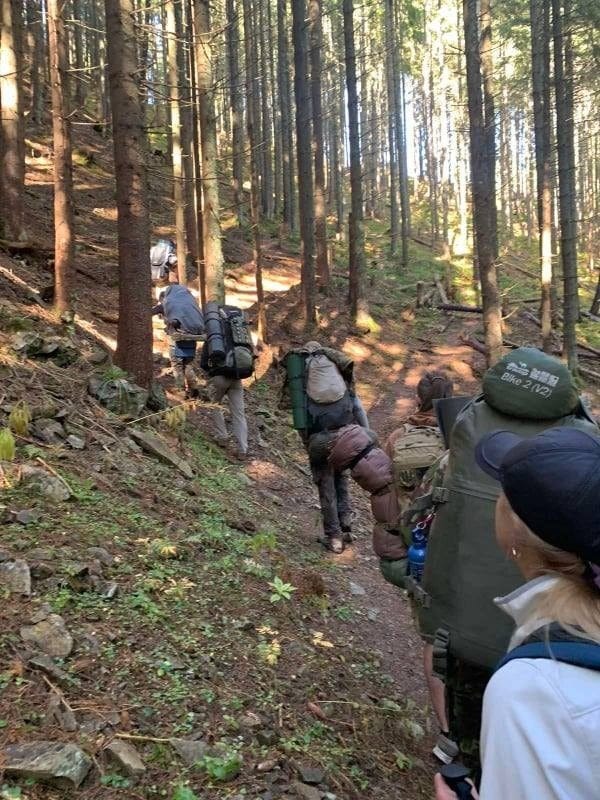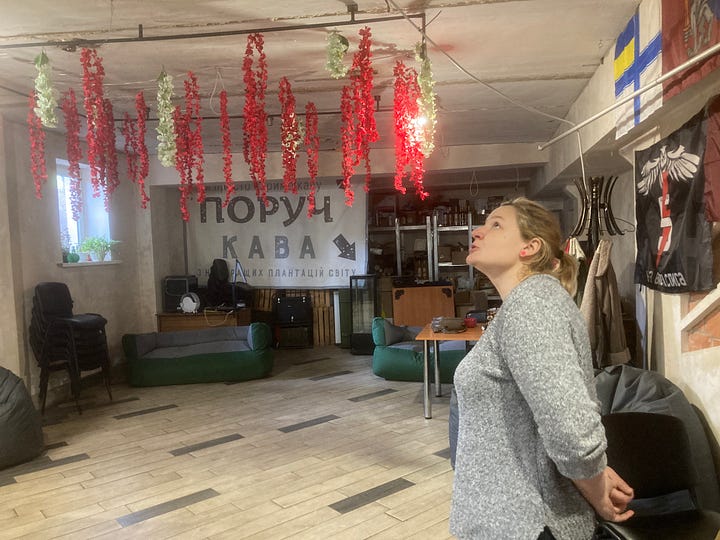Right Here: the Veterans' Centre
As a longstanding frontline city, Kramatorsk is home to many IDPs, and also veterans and their families who have a specific set of needs.
The war didn't start in 2022 but in 2014. For a few months there was fighting in Kramatorsk itself, and since then the front line has never been far away. The city is full of uniformed soldiers - in the centre, about a third of the people you see are in military uniform, often in large groups in cafes/restaurants, as Donetsk is a dry county without much public entertainment - and there is a large veteran community.
Yana is the co-ordinator of Tsentr Poruch, which literally means ‘Centre Alongside’, the implication being that it’s right here to hand, accessible to those who need such a place.
Who do you work with?
“In principle our doors are open to everyone, and we have activities aimed at IDPs and local residents, but the centre is mainly for veterans and their families. That includes everyone under the veteran policy umbrella – veterans, members of their families, and the families of the missing and deceased and those in captivity. We have up to a hundred clients a month.”
When did you start?
“We started eight years ago, in 2015, in a different location. We have a community organisation and the veterans’ hub is one project. As of today, 1 April, our centre has been in this building for exactly eight years.”
Why did you personally start working here?
“I like helping people. So I came here at first to hold various classes, language classes, classes for children, for example, and then I started to come to meetings. And then there was a difficult time for the centre, because it had been opened with the support of an international organisation. It received that support for a year and a half and then the organisation withdrew its support and we were left without any funding, as we’re a non-profit. And a large number of the people who worked in the centre, members of the team who were employed, had to leave, and the, let’s say, enthusiasts, were left.
We’re a social organisation, a non-profit organisation so we try to find funding from external sources. That’s mostly international organisations with whom we’ve worked on various projects. And we also have some experience of working with businesses, who’ve given us some funds, and we get some funding from the state, from regional budgets. When we have a chance to get funding, then we can pay our team members for their work. Otherwise, they operate on a volunteer basis.”
How many staff do you have?
There are seven permanent members of staff. After the full-scale invasion, some of our team joined the army. Some joined the army, some left Kramatorsk because, well, it’s a frontline city. Some of the team work remotely, and we have some new members. Our team are mostly veterans or members’ of veterans’ families.”

What do you offer as well as the cafe?
“Not financial assistance, because we’re looking for financial assistance ourselves! The idea of the centre is to provide complete support for veterans, complete reintegration. We work in the areas of psychology, legal, sport, strengthening the family, finding work and re-qualification. The fundamental idea of our centre is that it works on the basis of equality. That is, veterans help each other.
Recently we’ve added a very relevant new field of activity: veterans demobilised by injury. Especially in our area, there are a lot of veterans who are IDPs, who have problems with housing, medical treatment and rehabilitation, and many other things. So we take this person and work out with them how to achieve the best result. We talk to various institutions to help him find a place in civilian life.”
You work with male and female veterans?
“Yes. I just said ‘male veterans’ then [in Ukrainian and Russian the words for male veteran (ветеран/veteran) and female veteran (ветеранка/veteranka) are different] because there are fewer female veterans, but of course there are some.”
Are there differences between them?
“Yes, of course. They have similar experiences of war, but different needs. Female veterans might need a female doctor, for example. The structure of the female body is, let’s say, more delicate. They have to spend a lot of time in cold places [i.e. soldiers often have to live in trenches and basements]. So apart from the standard medical rehabilitation for male veterans, women also need help in the form of gynaecological examinations and treatment.
If you’re talking about work, then men and women have different needs there too. Though we do have gender equality. If a woman wants to work in a traditionally male job, she can, in principle. For example, we recently talked to a female veteran from Mariupol about her needs. She said she’s being offered routine work which is boring for a veteran with all her experience. Or work, that is, as she sees it, for men, such as driving. It’s important for women to have work opportunities they find acceptable.
But when it comes to advice on study, on business, psychological, legal help, it’s basically the same for women as for men.”
The veterans must have a lot of issues with PTSD and physical injuries?
“Yes, there are problems – but not that much PTSD. Not as many veterans have PTSD as an ordinary citizen might think, though of course there are cases. I came across an idea from an American psychologist that I like, that PTSD is basically a condition of the body, not a psychiatric disease as people think. It’s the bodily state of combat readiness.
As for physical injuries, of course there are a lot of people with amputated limbs and invisible disabilities. We are helping one veteran with a brain injury, cognitive impairment, after a head wound. It’s an organic injury to the brain and it affects his emotional state. There weren’t many such cases in 2014, but now I think there are places where such a person can adapt to his current condition.”


Which organisations do you work with?
“Before the full-scale invasion we had two veterans’ centres. In Kramatorsk and Pokrovsk. We’ve now evacuated from Pokrovsk, but now we’re opening veteran centres in Poltava oblast. And we’ve joined a coalition of about thirty veterans’ organisations from all around Ukraine.”
Can you talk about some of your clients?
“There’s a young woman from Mariupol who has an interesting story. Her husband, or maybe it was her partner, died, in Mariupol. She has two children, one of whom has a disability, who she brought out of Mariupol.
And now she’s been demobilised from the army and has decided to buy a little house in Dnipropetrovsk oblast, near Nikopol. There’s a small plot of land attached to the house and she’s thinking of becoming a smallholder. It’s hard for her now because she doesn’t get benefits; she’s applied, but there’s still a procedure, and a child with a disability also has his own documents. She has no work yet because it’s hard to find work in that locality…
This is one of the ways in which it’s different for male and female veterans that I didn’t mention. You know, male veterans are often treated as, ‘oh, our defenders’! They’re hailed as heroes. Of course, there are some negative attitudes, even in our society: people say they’re joined the army for money and so on. But there are many who are considered heroes, defenders. But the attitude to women is somewhat different. Far fewer people regard them positively. There’s a considerable stigma, the idea that women who serve in the army are loose, or they’re on the make somehow. So this veteran I’m talking about has to deal with that. It’s a long-term process.”


Let’s hope it doesn’t come to this, but if Kramatorsk has to be evacuated, what will you do?
“We very much hope it won’t come to that, but we’ve discussed the issue in principle. We will evacuate. We have a definite plan of action.
One of the areas we work in is community safety. In the beginning, when the full-scale invasion happened, a lot of people came to us. They obviously wanted to find support and felt that this was the place where they could find it. And we organised a course where veterans shared with the local population their knowledge about how to behave in dangerous situations, under shelling, how to provide medical assistance, how to maintain information security. And then we tailored the course for community leaders, people who organise [safety] procedures in towns and villages.
When we conducted this course in Poltava oblast, we included an element that helps community leaders think about how to make these safety procedures inclusive, comfortable for disabled people, elderly people, people with small children.
So we have experience of evacuation and organisation of safety procedures, and we will evacuate.”
After I talked to Yana, staff member Mar’iana gave me a quick tour of the centre.


As well as the event space (the big sign says PORUCH COFFEE and is a replica of the one on the outside of the building), there’s a gym for what Mar’iana called adrenaline therapy. There was also a family room, but it was stacked with chairs.
Mar’iana: “We show films, we do everything we can to make life more interesting. Because there’s nothing like that elsewhere. All Kramatorsk has is coffee shops!” [Kramatorsk has a curfew from 2100-0500, and is officially a dry county, though Mar’iana observed that, “If a guy drinks, he knows where to find the stuff.”]
We used to have events in the family room, events with children. English classes, various master-classes. But there aren’t enough people any more. Many have left Kramatorsk. And a lot of them are in the army.
Still, we have new people, new lads, coming from other towns. They come here for help and support.”






"People halping each other as equals": I love this. All have been experiencing war, but each person in a different way: the weaving together of the different competences, without a superior figure issuing the same pearls of wisdom to each, so to speak, is quite possibly the most helpful way to go. And the feline staff is sure to be a useful part of the process.
Excellent piece of work. I have shared it with my network on LinkedIn and Facebook.